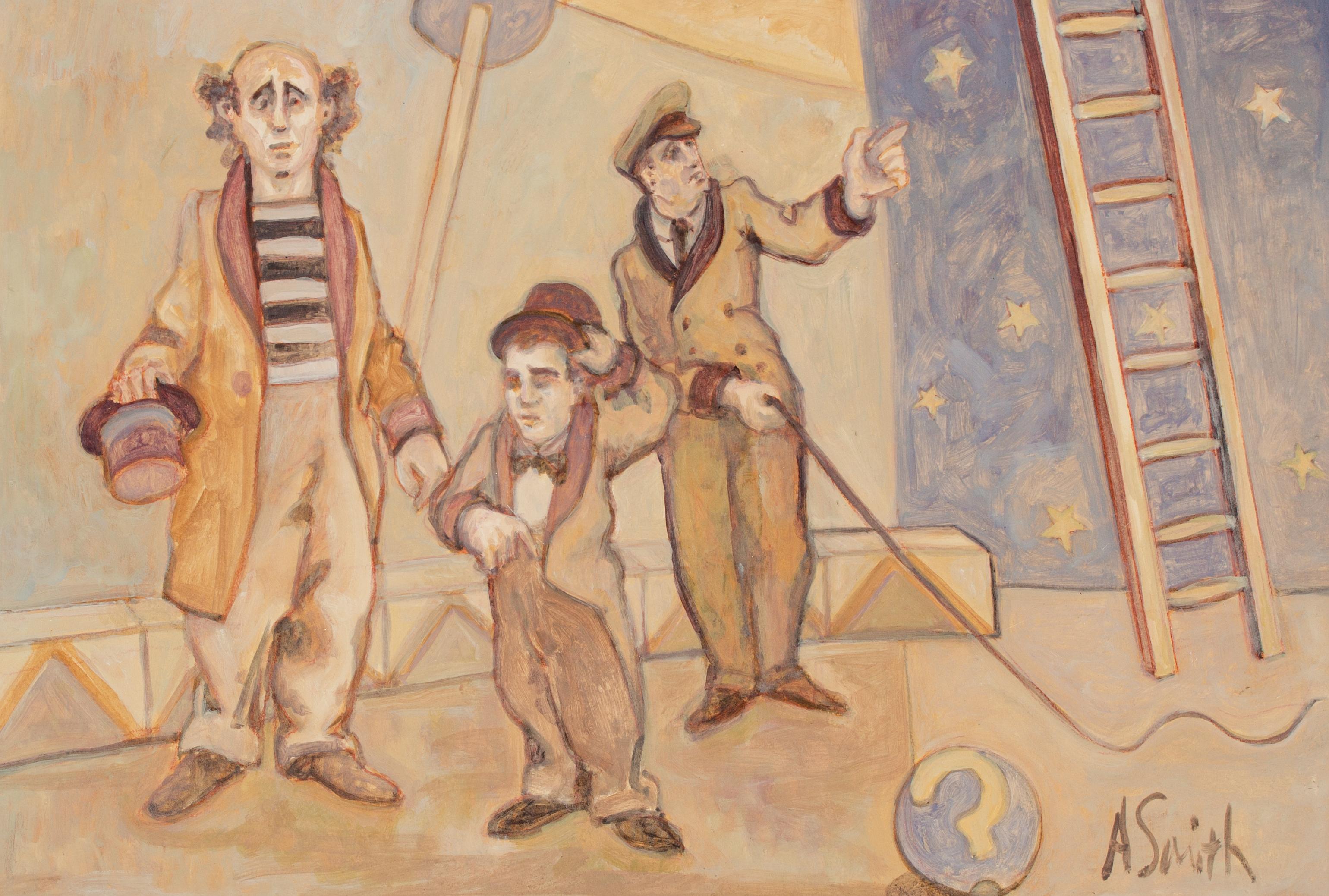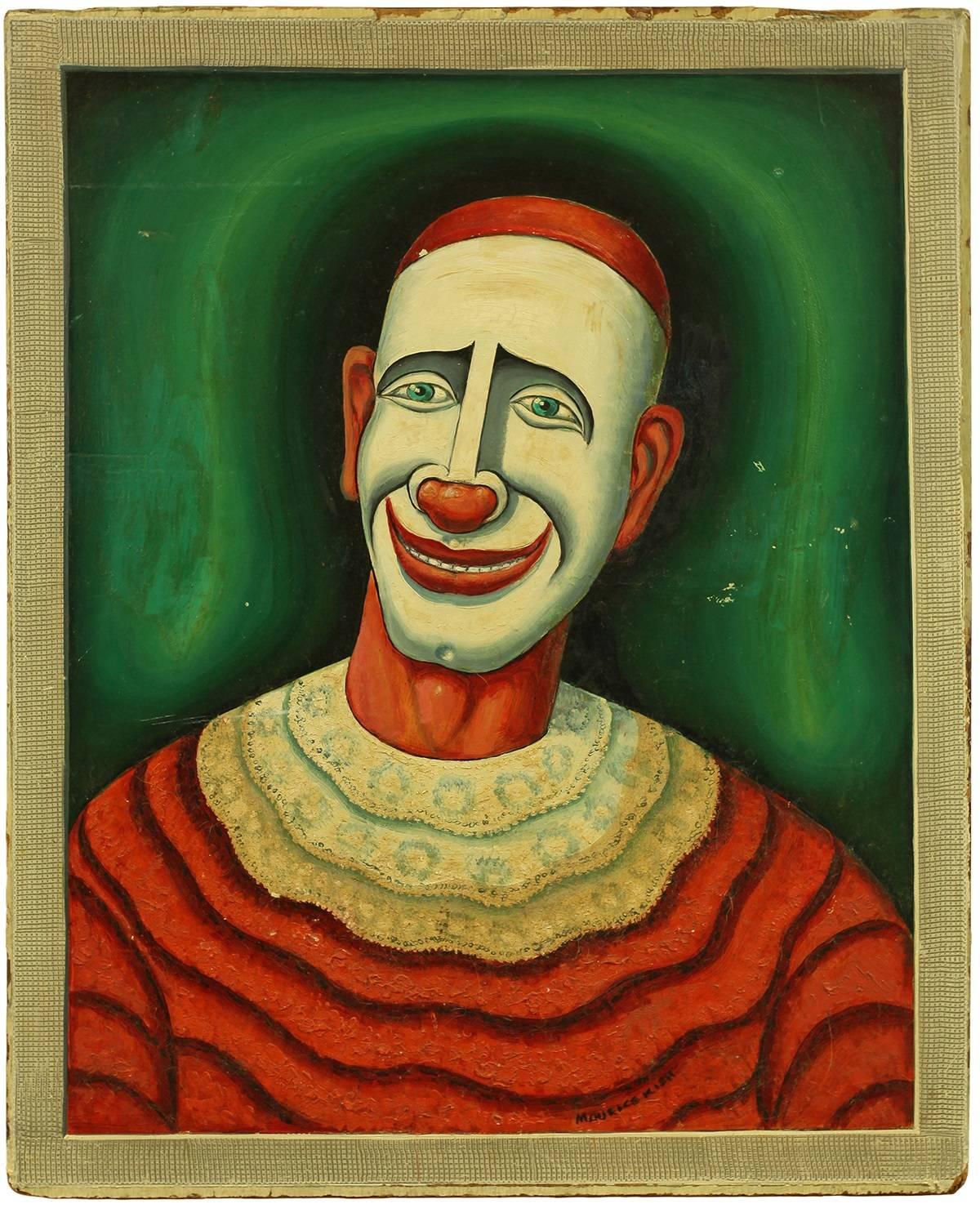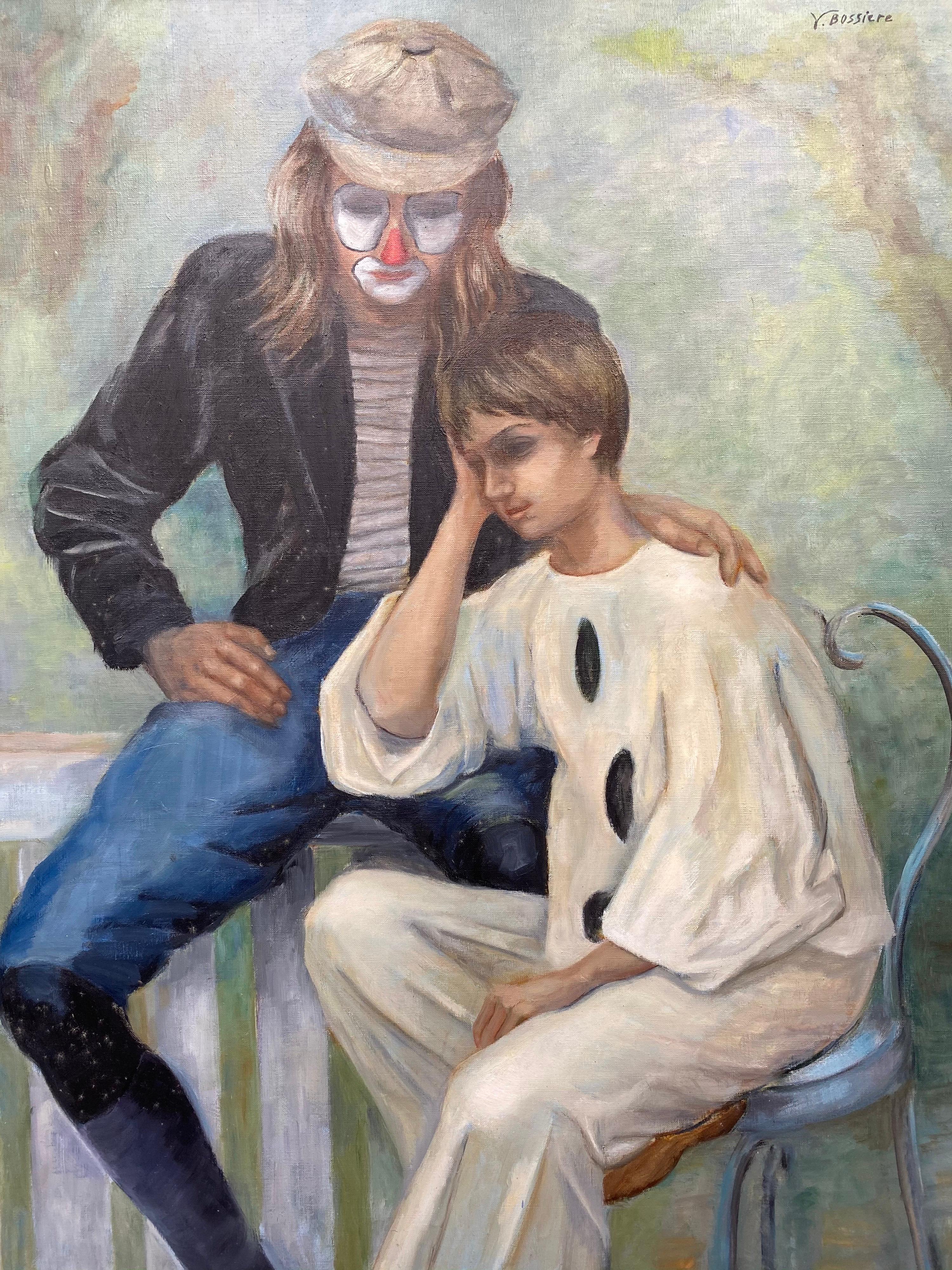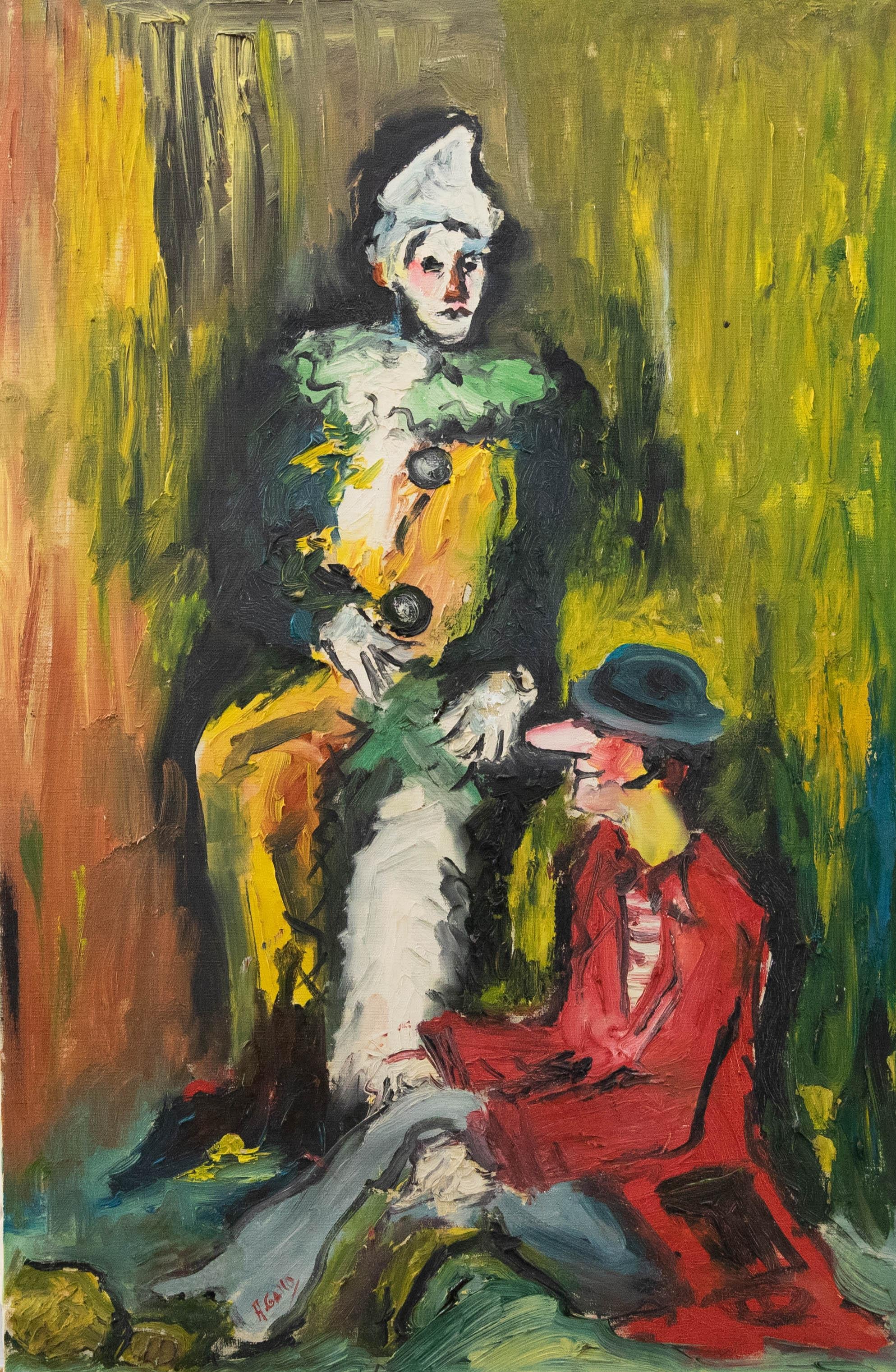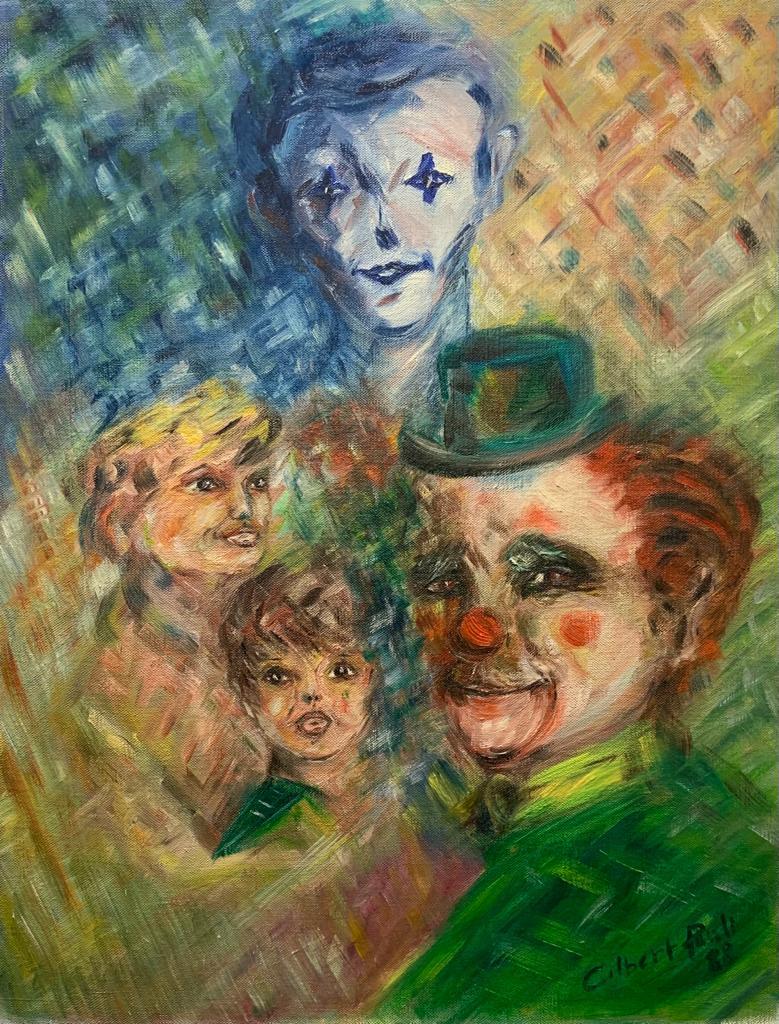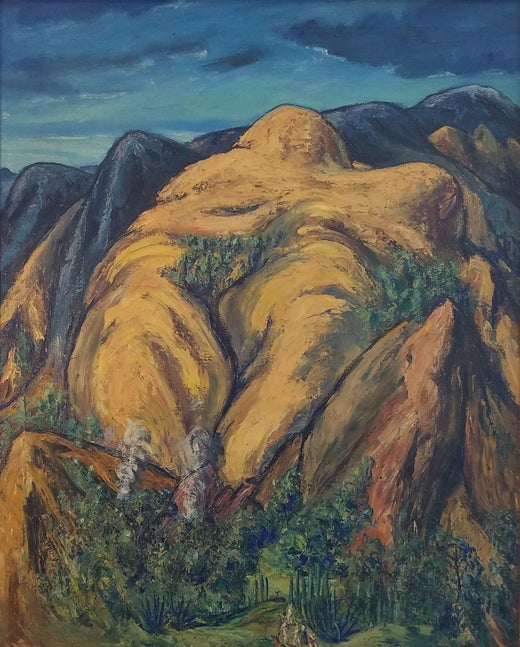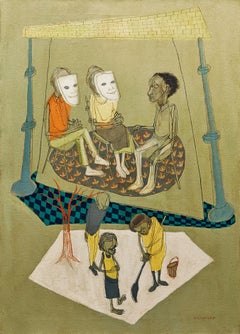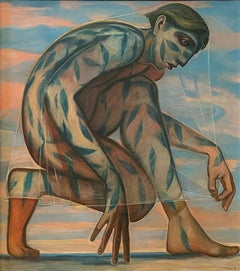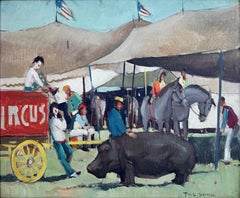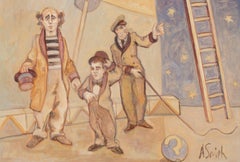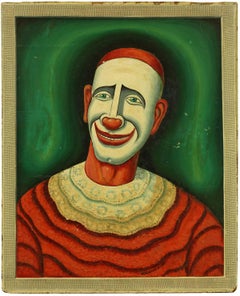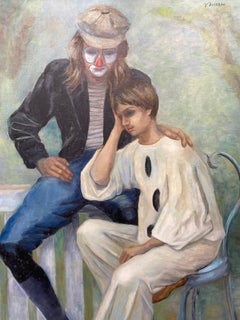Items Similar to "Clowns: Aren't We All?" Henry Glintenkamp, WPA Era Circus Figures, Modern
Want more images or videos?
Request additional images or videos from the seller
1 of 10
Hendrik Glintenkamp"Clowns: Aren't We All?" Henry Glintenkamp, WPA Era Circus Figures, Modern1942
1942
$2,200
$2,75020% Off
£1,646.58
£2,058.2320% Off
€1,906.64
€2,383.3020% Off
CA$3,057.64
CA$3,822.0520% Off
A$3,443.94
A$4,304.9220% Off
CHF 1,783.49
CHF 2,229.3620% Off
MX$41,825.24
MX$52,281.5520% Off
NOK 22,654.46
NOK 28,318.0720% Off
SEK 21,489.67
SEK 26,862.0820% Off
DKK 14,226.15
DKK 17,782.6920% Off
Shipping
Retrieving quote...The 1stDibs Promise:
Authenticity Guarantee,
Money-Back Guarantee,
24-Hour Cancellation
About the Item
Hendrik (Henry) J Glintenkamp
Clowns: Aren't We All?, 1942
Signed lower left; signed, titled and dated on the reverse
Oil on Masonite
20 x 16 inches
The painter and illustrator Henry Glintenkamp (1887-1946) is known mainly for his anti-war illustrations that appeared in The Masses and other publications in the early twentieth century. As a painter, he was additionally successful, particularly in his landscape and urban scenes. Born in Augusta, New Jersey, the son of Hendrik and Sophie Dietz Glintenkamp, Henry received his elementary art training at the National Academy of Design (1903-06) before his study with Robert Henri the two years following.
Henri consequently attracted artists like Glintenkamp interested in returning to a sense of human qualities. Setting up his studio in the Lincoln Arcade Building with Stuart Davis and Glenn O. Coleman, Glintenkamp did work that reflects a preoccupation with urban scenes and landscapes.
In May of 1910 Glintenkamp exhibited his works as a student at the Henri School and at the Exhibition of Independent Artists of 1910. Two years later, he accepted the position of instructor at the Hoboken Arts Club in New Jersey and in 1913, he took up with others in the organization of The Masses, designed as a publication devoted to humanitarian causes. This publication stood in stark opposition to war, as its articles and cartoons reflected pacifism. At the Armory Show (1913), Glintenkamp exhibited The Village Cemetery. In 1917, Glintenkamp moved to Mexico to avoid the draft, and remained there until 1924, supporting "the socialist agenda of Mexico's new leadership."
The period following 1917 marks a new phase in the artist's development. Brighter in color and compositionally more involved, his later works are more discordant than the artist's earlier work. The artist sacrificed the atmospheric quality of the limited palette for the increased influence of modernist movements. After extensive travels in Europe, Glintenkamp returned to New York in 1934, and became a teacher at the New York School of Fine and Industrial Art and the John Reed Club School of Art. As chairman for the committee responsible for the organization of an Exhibition in Defense of World Democracy, in 1937, Glintenkamp continued his humanitarian purpose, though never really took up with the socialist rebels, many of whom followed similar groups and publications. Indeed, Glintenkamp was instrumental in founding the American Artists' Congress; he continued serving its needs as both the organization's president and secretary. A peripheral member of the impressionist-tonalist group in his early career, Glintenkamp had progressed through many American movements by the time of his death in 1946.
- Creator:Hendrik Glintenkamp (1887 - 1946, American)
- Creation Year:1942
- Dimensions:Height: 26 in (66.04 cm)Width: 21.5 in (54.61 cm)
- Medium:
- Movement & Style:
- Period:
- Condition:
- Gallery Location:New York, NY
- Reference Number:1stDibs: LU1841214152632
Hendrik Glintenkamp
The painter and illustrator Henry Glintenkamp (1887-1946) is known mainly for his anti-war illustrations that appeared in The Masses and other publications in the early twentieth century. As a painter, he was additionally successful, particularly in his landscape and urban scenes. Born in Augusta, New Jersey, the son of Hendrik and Sophie Dietz Glintenkamp, Henry received his elementary art training at the National Academy of Design (1903-06) before his study with Robert Henri the two years following. Henri consequently attracted artists like Glintenkamp interested in returning to a sense of human qualities. Setting up his studio in the Lincoln Arcade Building with Stuart Davis and Glenn O. Coleman, Glintenkamp did work that reflects a preoccupation with urban scenes and landscapes. In May of 1910 Glintenkamp exhibited his works as a student at the Henri School and at the Exhibition of Independent Artists of 1910. Two years later, he accepted the position of instructor at the Hoboken Arts Club in New Jersey and in 1913, he took up with others in the organization of The Masses, designed as a publication devoted to humanitarian causes. This publication stood in stark opposition to war, as its articles and cartoons reflected pacifism. At the Armory Show (1913), Glintenkamp exhibited The Village Cemetery. In 1917, Glintenkamp moved to Mexico to avoid the draft, and remained there until 1924, supporting "the socialist agenda of Mexico's new leadership." The period following 1917 marks a new phase in the artist's development. Brighter in color and compositionally more involved, his later works are more discordant than the artist's earlier work. The artist sacrificed the atmospheric quality of the limited palette for the increased influence of modernist movements. After extensive travels in Europe, Glintenkamp returned to New York in 1934, and became a teacher at the New York School of Fine and Industrial Art and the John Reed Club School of Art. As chairman for the committee responsible for the organization of an Exhibition in Defense of World Democracy, in 1937, Glintenkamp continued his humanitarian purpose, though never really took up with the socialist rebels, many of whom followed similar groups and publications. Indeed, Glintenkamp was instrumental in founding the American Artists' Congress; he continued serving its needs as both the organization's president and secretary. A peripheral member of the impressionist-tonalist group in his early career, Glintenkamp had progressed through many American movements by the time of his death in 1946.
About the Seller
5.0
Platinum Seller
Premium sellers with a 4.7+ rating and 24-hour response times
Established in 2022
1stDibs seller since 2022
108 sales on 1stDibs
Typical response time: <1 hour
- ShippingRetrieving quote...Shipping from: New York, NY
- Return Policy
Authenticity Guarantee
In the unlikely event there’s an issue with an item’s authenticity, contact us within 1 year for a full refund. DetailsMoney-Back Guarantee
If your item is not as described, is damaged in transit, or does not arrive, contact us within 7 days for a full refund. Details24-Hour Cancellation
You have a 24-hour grace period in which to reconsider your purchase, with no questions asked.Vetted Professional Sellers
Our world-class sellers must adhere to strict standards for service and quality, maintaining the integrity of our listings.Price-Match Guarantee
If you find that a seller listed the same item for a lower price elsewhere, we’ll match it.Trusted Global Delivery
Our best-in-class carrier network provides specialized shipping options worldwide, including custom delivery.More From This Seller
View All"False Faces" Sonia Gechtoff, circa 1950 Social Commentary Realist Painting
By Sonia Gechtoff
Located in New York, NY
Sonia Gechtoff
False Faces, circa 1950-52
Signed lower right
Oil on canvas
30 x 22 1/4 inches
Sonia Gechtoff was born in Philadelphia to Ethel "Etya" and ...
Category
1950s Realist Figurative Paintings
Materials
Canvas, Oil
"Deception, " Keith McIntyre, Surrealist Figure, Scottish Artist
By Keith McIntyre
Located in New York, NY
Keith McIntyre (Scottish, b. 1959)
Deception, 1996
Oil on canvas
30 x 28 inches
Signed and dated lower right
Scottish Artist Keith McIntyre was born ...
Category
1990s Surrealist Figurative Paintings
Materials
Canvas, Oil
"Untitled, " Sebastian Gross-Ossa, Contemporary Figurative Painting
Located in New York, NY
Sebastian Gross-Ossa (American, b. 1966)
Untitled, 2000
Oil on canvas
14 1/8 x 11 inches
Signed and dated on the reverse
Category
Early 2000s Contemporary Figurative Paintings
Materials
Oil, Canvas
$3,200 Sale Price
20% Off
"Hippo" Paul Sample, Regionalist, Atmospheric Circus Performers and Aminal Scene
By Paul Sample
Located in New York, NY
Paul Sample
Hippo
Signed lower right
Oil on canvas
16 x 20 inches
Provenance
Chidsey Collection
Private Collection (acquired from the above in 1980)
Sample's attempt to impose a T...
Category
1930s Realist Figurative Paintings
Materials
Canvas, Oil
"Two Figures, " Louis Stone, Abstract, American WPA Modernism
By Louis Stone
Located in New York, NY
Louis K. Stone (1902 - 1984)
Two Figures, 1980
Mixed media on paper
Sight 52 x 42 inches
Signed and dated lower right
Louis King Stone was born in Findlay, Ohio in 1902 and received...
Category
1980s Abstract Abstract Paintings
Materials
Paper, Mixed Media
"Untitled" Gerome Kamrowski, circa 1944 American Surrealist Composition
By Gerome Kamrowski
Located in New York, NY
Gerome Kamrowski
Untitled, circa 1944
Signed lower right
Oil on canvas
35 3/4 inches x 47 3/4 inches
Gerome Kamrowski was born in Warren, Minnesota, on January 19, 1914. In 1932 he...
Category
1940s Surrealist Abstract Paintings
Materials
Canvas, Oil
You May Also Like
Circus Performers by WPA Artist Arthur Smith
By Arthur Smith
Located in New York, NY
Arthur Smith (American, 1897-1972)
Untitled (Circus Performers), 20th century
Oil on board
21 x 18 7/8 in.
Framed: 26 3/4 x 35 3/4 in.
Signed lower right: A Smith
Arthur Smith is a...
Category
20th Century Modern Figurative Paintings
Materials
Oil, Board
Clown, Early 20th Century Playful Oil Painting on Board
By Maurice Kish
Located in Surfside, FL
This portrait of a clown by Maurice Kish is part from a series of carnival figures, circus clowns and carousel horses and riders that he did in the 30s and 40s. The artist uses a vibrant color palette and controlled brushstrokes to depict the subject in a realistic way.
The imagery of Maurice Kish (1895-1987), whether factories or carousels, reliably subverts expectations. His vision hovers just around the unraveling edge of things, where what is solid and clear becomes ambiguous. He is fascinated, often delighted, by the falling apart. This unexpected, fresh perspective results in oddly affecting pictures of a now long-gone New York.
Born Moishe in a town called Dvinsk, Russia (what is now Daugavpils, Latvia), Kish came with his family to New York when he was in his teens. The family settled in Brownsville, and for the rest of Kish’s life Brooklyn remained his home, though he moved from one neighborhood to another. He was close to his parents, who recognized his talent and supported his desire to become an artist.
Kish attended the National Academy of Design as well as Cooper Union. His fellow students included many other immigrants and children of immigrants who were particularly receptive to the Modernism coming from Europe. As his career progressed, Kish himself applied different strains of Modernism to different purposes. For him, the story was held above all else.
For years, Kish used the skills he acquired in art school to earn his living at a Manhattan glass...
Category
Early 20th Century Modern Portrait Paintings
Materials
Oil, Board
Oil painting of Clown
Located in Fredericksburg, VA
This is a painting done by the American artist L.A. McMillen. It is signed lower right and is in excellent condition for the period. This shows a clown scene with the face of a man i...
Category
Early 20th Century Surrealist Figurative Paintings
Materials
Canvas, Oil
Large 20th Century French Impressionist Oil - Two Circus Clowns/ Performers
Located in Cirencester, Gloucestershire
Artist: Yvette Bossiere (French, b.1926) signed lower corner and verso
Title: The Two Performers
Medium: oil painting on canvas, unframed
Size: painting: 26 x 29 inches
Provenanc...
Category
Mid-20th Century Impressionist Figurative Paintings
Materials
Oil
H. Gallo - 20th Century Oil, Two Clowns
Located in Corsham, GB
A charismatic portrait study of two clowns in full costume. The artist captures the figures using expressive brushwork and a vibrant palette. Signed to the ...
Category
20th Century Figurative Paintings
Materials
Oil
$328 Sale Price
20% Off
Circus characters by Gilbert Pauli - Oil on canvas 55x42 cm
By Gilbert Pauli
Located in Geneva, CH
Born in 1944 in the canton of Fribourg, Gilbert Pauli currently lives in Geneva, where he devotes himself to painting and sculpture, a passion he developed from his childhood. His fa...
Category
1980s Art Deco Portrait Paintings
Materials
Oil
$576 Sale Price
69% Off
More Ways To Browse
Circus Clown Art
National Socialist
Vintage Circus Clown
Vintage Clowns Clowns Circuses
Wpa Era Paintings
J Davis
Oil Paintings Signed By Stuart
Stark Robert
Vintage Clown Oil Paintings
Augustas John
J Glenn
Industrial 1940 Wpa Painting
Robert Stark Oil
Stuart Henry
Henry Stuart Brown
Stark Davis
Primitive Folk Art Paintings
Girl And Cat
